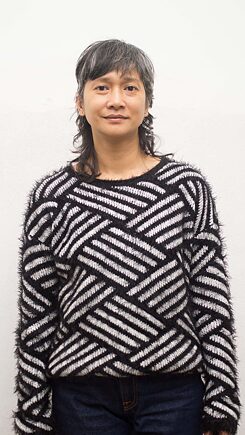Curatorial Statement
Kinofest 2024
Lisabona Rahman studied Moving Image Preservation and Presentation in Amsterdam. Her approach stems from intersecting interests in cinema practice and history within post-colonial societies, transnational networks, and women's work. She conducts performative lectures that incorporate stories derived from filmic artifacts, as well as knowledge-sharing activities related to analog film and methods of tracing their life histories. These activities have taken place in various cities such as Berlin, Cairo, Jakarta, and Jos.
Lisabona has also curated film screening programs for festivals, archives, and galleries. She began her career as a film programmer during the early years of Kineforum with the Jakarta Arts Council in 2006. Since then, she has collaborated with various festivals and institutions in Asia and Europe. Her works have been created and exhibited with the support of institutions such as the Arsenal Institute in Berlin, EYE Filmmuseum Amsterdam, Film Archive Public Organization of Thailand, and Rubanah Underground Hub Jakarta. In 2024, Lisabona participated in the selection committee of the Forum section of the Berlinale Film Festival. She is also a co-founder of Sekolah Pemikiran Perempuan (School of Women’s Thought) and Kelas Liarsip - collectives of artists, writers, and cultural workers actively creating learning spaces and events for feminists of the Nusantara archipelago, nurturing transnational solidarity.
Lisabona has also curated film screening programs for festivals, archives, and galleries. She began her career as a film programmer during the early years of Kineforum with the Jakarta Arts Council in 2006. Since then, she has collaborated with various festivals and institutions in Asia and Europe. Her works have been created and exhibited with the support of institutions such as the Arsenal Institute in Berlin, EYE Filmmuseum Amsterdam, Film Archive Public Organization of Thailand, and Rubanah Underground Hub Jakarta. In 2024, Lisabona participated in the selection committee of the Forum section of the Berlinale Film Festival. She is also a co-founder of Sekolah Pemikiran Perempuan (School of Women’s Thought) and Kelas Liarsip - collectives of artists, writers, and cultural workers actively creating learning spaces and events for feminists of the Nusantara archipelago, nurturing transnational solidarity.
